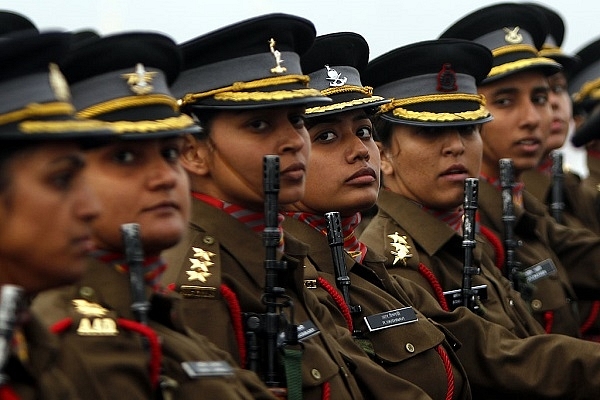
SC’s Woke Judgement: A Permanent Commission For Women Is Right But For Wrong Reasons
What Justice Chandrachud’s judgement does is to make better the enemy of the best.
We don’t need such woke judgements to steadily set right the negative effects of misogyny and patriarchy.
The Supreme Court’s decision last Thursday (25 March) to junk the rules that prevented women Short Service Commission officers from getting permanent commissions in the armed forces is correct. However, one has to question whether it had to bring in “woke” yardsticks and dubious jurisprudence from western court verdicts and embed them into Indian judicial thinking.
The bench, headed by “liberal” Justice D Y Chandrachud and Justice M R Shah, rejected the army’s decision to impose fitness standards of 35-year-old male officers on women officers who were in the late forties in order to qualify for permanent commissions.
It is not at all necessary for both men and women to be judged by the same standards even for the same age, for commonsense tells us that men and women – on an average – are different in terms of physical build, size, weight and testosterone levels.
We have separate men’s and women’s sports precisely for this reason. It is fair and enough if women are judged by standards appropriate to women in order to receive a permanent commission.
The problem with the judgement is not in its decision to end the exclusion of women from permanent commissions, but the reasoning and resort to virtue-signalling. While one can let pass the statement that “the structures of our society have been created by males and for males,” the decision to bring in a new doctrine to judge all laws on the basis of “indirect discrimination” is going to be deeply problematic. It confuses differentiation with discrimination and presumes that dissimilar outcomes imply inherent discrimination.
This is the basis on which Justice Chandrachud and three fellow judges voted 4:1 to open up Sabarimala for all ages, and not just women outside the child-bearing age. Diversity of practices was junked in favour of fictitious uniformity and equality. If this is going to be the norm for every judgement in future, we are going to be in deep trouble as a society.
The judgement says, inter alia:
“As long as a court’s focus is on the mental state underlying the impugned action that is allegedly discriminatory, we are in the territory of direct discrimination. However, when the focus switches to the effects of the concerned action, we enter the territory of indirect discrimination.”
“An enquiry as to indirect discrimination looks not at the form of the impugned conduct, but at its consequences.”
“Indirect discrimination is caused by facially neutral criteria by not taking into consideration the underlying effects of a provision, practice or a criterion….The doctrine of indirect discrimination is founded on the compelling insight that discrimination can often be a function not of conscious design or malicious intent, but unconscious/implicit biases or an inability to recognise how existing structures/institutions and ways of doing things have the consequence of freezing an unjust status quo. In order to achieve substantive equality prescribed under the constitution, indirect discrimination, even sans discriminatory intent, must be prohibited.” (Italics mine)
This is wokeism pure and simple. It is one thing to ensure that women get to rise as much as they want to in any profession, quite another to assume that if they don’t, then this constitutes “indirect discrimination”.
What Justice Chandrachud is effectively saying is that if we see certain outcomes that we don’t like, we must presume that they have resulted from social or other structures that have made the field unlevel, whether it involves women or the poor or the castes who face(d) discrimination. We have shifted the goalpost from equality of opportunity to equality of outcomes.
Now look at the practical consequences of applying this doctrine:
One, if Africans dominate all athletic sports, this constitutes some kind of indirect discrimination against non-Africans. So, we must change the rules to ensure that more non-Africans get to participate in basketball or sprints or marathons.
Two, if more boys than girls get into IITs and IIMs, the tests must be changed to make sure that there is no indirect discrimination against women.
Three, if more women get into nursing and healthcare and education than men, it must be because men are indirectly discriminated against.
This is judicial wokeism of a kind where we are told that any outcome not seen as proportional to your share in the population must be seen as unfair and resulting from “indirect discrimination”.
Indirect discrimination surely exists, for in a patriarchal world men did indeed decide how things must be done, measured or approached. They set the rules, and these rules can surely be changed to make the world more inclusive.
But nobody on earth, and no law certainly, can set right the reality that different people have different strengths and weaknesses, whether caused by social backwardness or physiology, nature or evolution.
The right way to approach the issue is to ensure fairer and better outcomes through some forms of affirmative action and deep studies of any inherent biases that we did not earlier acknowledge. But even after this we care not going to see ideal outcomes. The world is too imperfect for that, and seeking perfection and uniformity only ensures more suffering.
What Justice Chandrachud’s judgement does is to make better the enemy of the best. To repeat, we don’t need such woke judgements to steadily set right the negative effects of misogyny and patriarchy.
We need to change incrementally and steadily, at a pace which does not destroy the very society which nurtures both men and women, the rich and the poor, in invisible ways.